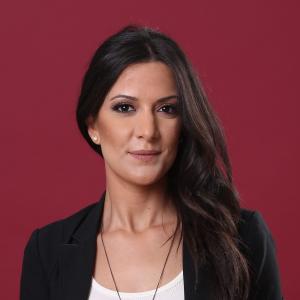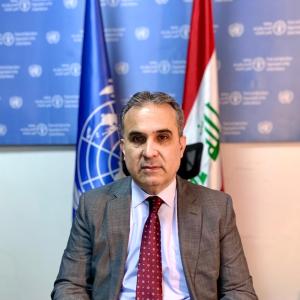Pioneering Initiative to Promote Sustainable Agriculture Using Mechanical Rice Transplanters in Najaf
08 July 2024
Under the patronage of His Excellency the Minister of Agriculture, Dr. Abbas Jabr Al-Maliki, the Food and Agriculture Organization of the United Nations (FAO), in collaboration with the Najaf Directorate of Agriculture and with support from the Ministries of Agriculture and Water Resources and the Najaf Governorate Council, organized a field event for rice planting using a package of technologies including mechanical transplanting in Al-Mishkhab district.

These activities are part of the Project “Enhance climate resilience of vulnerable agriculture households in Southern Iraq through the promotion of climate smart water management and good agriculture practices in selected value chains" funded by the Swedish International Development Cooperation Agency (SIDA). The project aims to rationalize water use and improve productivity to adapt to conditions of water scarcity and climate change.
The event was attended by the Deputy Minister of Water Resources, FAO Iraq Representative Dr. Salah El Hajj Hassan and the FAO Project team, General Directors of Horticulture and Agricultural Extension Departments at the Ministry of Agriculture, Governor's Advisor for Agricultural Affairs, the President of the Union of Agricultural Associations, and many rice farmers.
The event aimed to highlight the benefits and advantages of the mechanical transplanting approach, most notably water saving and cost-effectiveness of agricultural inputs such as seeds, pesticides, and labor costs, in addition to reducing pollution. Compared to traditional planting methods entailing the use of relatively large amounts of water and seeds, mechanical transplanting achieves numerous benefits. These include saving approximately 25% of irrigation water, reducing seed usage by at least 75%, pesticide usage by 95%, and herbicide usage by 80%. Additionally, it reduces labor costs and ensures high uniformity in growth, which enhances productivity, and provides high flexibility to adapt to weather fluctuations at the start of the planting season.
In this context, Dr. Salah El Hajj Hassan stated, "This initiative represents an important step towards promoting sustainable agricultural practices in Iraq. The use of mechanical transplanting will significantly contribute to saving water and agricultural resources, thereby enhancing farmers' ability to adapt to climate change." The representative of the Ministry of Agriculture added, "We are committed to supporting modern agricultural technologies such as mechanical transplanting through our cooperation with the FAO, as they provide practical solutions to the challenges facing agriculture in Iraq, especially concerning water scarcity."
The partners have finally agreed on the importance of establishing appropriate mechanisms to utilize the transplanters available from the Ministry of Agriculture to expand the use of these agricultural technologies. This agreement aims to ensure the continuity and sustainability of using mechanical transplanters, contributing to improved agricultural productivity and reduced resources consumption.
This initiative supports several Sustainable Development Goals (SDGs), including SDG 2: Zero Hunger, by enhancing food production efficiency; SDG 6: Clean Water and Sanitation, through the sustainable use of water resources; and SDG 13: Climate Action, by promoting practices that help farmers adapt to climate change impacts.


He started his career in 1984, as Senior Research Assistant in the Agricultural Research and Education Centre (AREC), American University of Beirut. From 1987 to 1991, he was Coordinator of the Student Training Programme, and also Agriculture and Horticultural Teacher for the Faculty of Agriculture, at the Lebanese University.
From 1991 to 1995, he worked as Agricultural Engineer at the Ministry of Agriculture, Bekaa Regional Office, Zahlah and was then assigned to the Agricultural Research Institute in the Tal Amara station, first as Head of the Crop Production Department and subsequently in charge of the Plant Protection Laboratory. From 2002 to 2006, he was Director of the Kfardane Research Station (Agricultural Research Institute). In 2008, he became Visiting Scientist at the International Maize and Wheat Improvement Centre (CIMMYT) and Coordinator of a project with the International Centre for Atomic Energy Agency, Vienna.
In 2010, he served as Advisor to the Minister for Agriculture of Lebanon. In 2011, he became President of the Pesticide Scientific Committee, Head of the Phytoplasma Committee and Director of the Agriculture and Rural Development Programme (ARDP) (EU-funded project). From 2010 to 2013, he represented Lebanon in negotiations with EU, Egypt, Jordan and Iraq. During his career, Mr Hajj Hassan also carried out a number of other functions. He represented the Lebanese Agricultural Research Institute (LARI) in several research programmes with the International Centre for Agricultural Research in the Dry Areas (ICARDA) and the American University of Beirut. He was Coordinator of the Mashreq/Maghreb project with ICARDA, representing Lebanon in the Steering Committee, as well as being the Head of the Sugar-beet Delivery and of the Wheat Delivery Committees. For a number of years, Mr Hajj Hassan worked for the preparation of FAO TCP projects and served as the National Director of a TCP project. He joined FAO in January 2014 as FAO Representative in Yemen. Mr Hajj Hassan succeeds Mr El Zubi as FAO Representative in Iraq.



